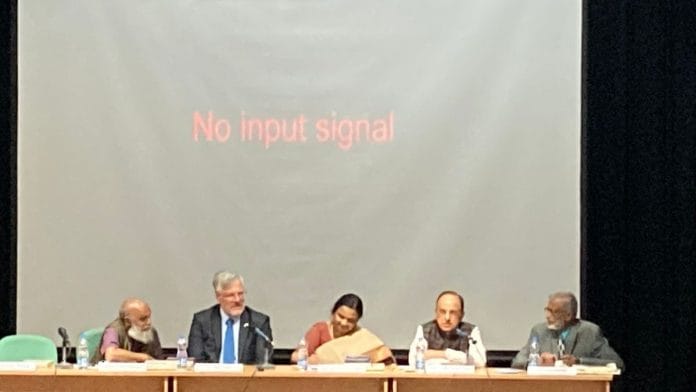New Delhi: The one question that Delhi’s intelligentsia grappled with during the launch of PR Kumaraswamy’s The Arab – Israeli Conflict: A Ringside View was whether there is indeed a conflict between Israel and the Arab world of today.
“There is a reality that the Palestine – Israel conflict is falling off the map, but the faultlines from the issue will remain,” said Commodore C Uday Bhaskar, director at Society for Policy Studies and a panellist at the event held at Jawaharlal Nehru University grounds last week.
“The Arab – Israeli conflict is not what it used to be – in the foreseeable future, the Kingdom of Saudi Arabia and Israel are to have formal relations,” added Subramanian Swamy, a former Member of Parliament.
The book that prompted this animated discussion delves into the history of the Arab – Israeli conflict, giving an exhaustive account of the complexities surrounding the region and, as Bhaskar explained, the current options for India.
Naor Gilon, Israeli ambassador to India, also spoke during the launch, stating that positive developments have shaped a new reality in the Middle East. The signing of the Abraham Accords in 2020, for one, normalised Israeli relations with the United Arab Emirates and Bahrain, while the subsequent creation of groupings such as I2U2 with Israel, India, UAE and the United States in 2021, strengthened its diplomatic ties.
Despite these messages of a new reality, Ambassador Gilon did concede that the situation in the Middle East will “always be a struggle”.
This is where the book plays an important role, said Kumaraswamy, as one “cannot explain the present situation without understanding the past.”
Also read:
‘Historic connection with the Jewish people’
New Delhi’s relationship with Tel Aviv has seen many crests and troughs – including a time where it was considered blasphemous to even name the latter in India. Things only changed in 1992, when the nations first formed close strategic ties. Narendra Modi is the only Indian prime minister to have officially visited Israel in 2017.
While describing the historical connection between India and the Jewish people, Swamy said that “they were never persecuted in India.” He also credited Kolkata-born Baghdadi Jew Lieutenant General JFR Jacob for making the capture of Dhaka possible during the 1971 Bangladesh Liberation War.
“We cannot treat Israel like every other nation,” he declared.
It was once ‘unfashionable’ to study Israel
Swamy has been vocal in his support of strengthening the India – Israel relationship since the 1980s, and Kumaraswamy has acknowledged the former’s influence on his career trajectory. Kumarswamy chose to study Israel during his graduate studies after reading a 1982 magazine article by Swamy. And he went ahead even though his choice was considered “unfashionable” at the time.
The author went on to describe the evolution of India-Israel relations through the gradual ease in challenges Indians faced while travelling to the country.
Indians would fly to Israel via Rome, and after the normalisation of ties between Egypt and Israel, via Cairo. “It was only in 2017 when a direct Delhi-Tel Aviv flight opened,” said Kumaraswamy.
Living in Israel gave Kumaraswamy a ringside view of the conflict. “I have been closest to the problem but as an outsider,” he told ThePrint. This motivated him to share his experience and explain the complexities of the Arab-Israeli relationship.
“It is important to understand Kumaraswamy’s perspective on the issue – especially given the serious misunderstanding of Israel and the sensitivities around the history of the Jewish people in India,” said Arjun Haridas, an India representative of the American Jewish Committee and an attendee at the event, which Delhi Police and the Israeli Embassy tightly guarded.
Swamy even made a quip at the end of the event, congratulating JNU’s vice-chancellor for bringing “peace” to the varsity. He later posted on the social media platform X, formerly known as Twitter, about how JNU is now a “genuine university”.
(Edited by Zoya Bhatti)






